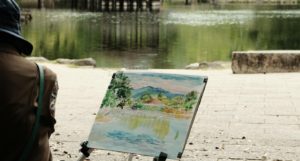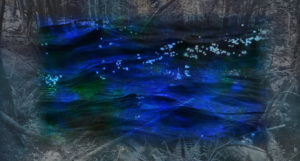CREWW project is ‘storying’ the science behind our waterways

A unique arts-led University of Exeter project is aiming to bring the science behind our water system to life in the form of audio stories to engage the public.
‘Storying Water’ is led by Dr Ellen Wiles, artist-in-residence at the University’s Centre for Resilience in Environment, Water and Waste (CREWW), and supported by the Centre’s joint funder, South West Water.
Dr Wiles is a novelist, sound artist, anthropologist, and Senior Lecturer in Creative Writing. She will collaborate with scientists, and with other experts, to translate their research, experience and ideas into compelling audio storytelling, and to explore new possibilities for arts-based engagement with science research.
Dr Wiles said she was thrilled to be the first artist-in-residence at CREWW and will be producing a series of informative and imaginative podcasts about the water system.
“It’s fascinating to be embedded with a group of leading scientists who are pioneering in this area, and with their help I’m beginning to get my head around their vital (and exceedingly complicated) research on things like nature-based solutions, water quality and more — it’s great to be collaborating with them on creative storytelling,” she said.
The project will explore the water system – what it means to people, how it works, challenges involved in maintaining it, species affected by human uses of it, why its future resilience is threatened, and, in the face of environmental emergency, what is needed to improve and protect it into the future.
So far Ellen has led creative writing workshops with scientists, engineers, executives & managers who work professionally with the water system to share their experiences and discuss what is needed for its future resilience.
Participants included hydrologists and biologists CREWW, engineers and senior executives from South West Water, South West Peatland Partnership and Ofwat, members of the University of Exeter’s Centre for Water Systems and managers from Dartmoor National Park Authority among others.
“All the participants turned out to be bubbling with personal experiences on/in/with water that they rarely get the chance to explore in conjunction with their professional water personas and were enthused about trying new forms of writing. It was great to share ideas about imaginative storytelling, and to talk about how important this is as a strategy to engage diverse audiences meaningfully with the science and biodiversity of our waterways,” she said.
Delegates went on a walk through the wildest part of the University of Exeter campus to explore its very own nature-based solutions project underway in the Lower Hoopern Valley, supported by Environment Agency, and read and discussed poetry and prose by contemporary writers engaging with water systems and activism, and experimented with writing and creative mapping exercises accompanied by watery soundscapes.
The project will produce two podcasts: an informative podcast, following the path of the Exe from source to sea, and exploring key elements of the water system on the way; and an imaginative podcast involving fiction and reflecting on the water system from non-human points of view.
South West Water’s Director of Natural Resources, Carolyn Cadman, was among those attending the initial workshop. She said: “We’re excited to support Ellen’s ongoing work, including a future podcast series sharing expertise on the Exe catchment using these engaging methods.”
James Jenkins, OFWAT’s Head of Delivery (Environment) said: “It was absolutely fascinating to see and experience firsthand how storytelling can be used to build / understand relationships with water.”
If you research or work with the water system, or if you are interested in the project and would like to find out more and to hear about future events through the mailing list, please contact Ellen or the CREWW team at CREWW@exeter.ac.uk.
More information about the project can be found here: https://www.exeter.ac.uk/research/creww/projects/storyingwater/



